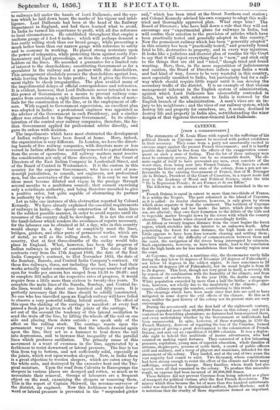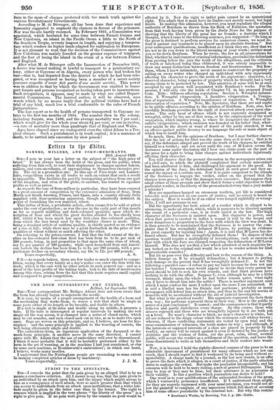CAYENNE.
[FROM A COltRESPONDENT.]
The statements of M. Louis Blanc with regard to the sufferings of his political friends in Cayenne cannot be received with perfect confidence in their accuracy. They come from a party not unnaturally excited to extreme anger against the present French Government ; and it is hardly possible they should be free from the effects of the exaggeration conse- quent on such a state of feeling. That the lot of these unhappy men must be extremely severe, :there can be no reasonable doubt. The cli- mate ought of itself to have prevented any men, even convicts of the worst class, from being sent into French Guiana. We have in a short compass the history and present state of the colony, from a pen not un- favourable to the existing Government of France, that of M. Berenger (de In DrOme), President of the Court of Caseation, in a report made last year to the Academy of Moral and Political Science, under the title
De la Repression Penale -, de see Formes et de sea Effete." The following is an abstract of the information furnished in the re- port. French Guiana is equal in extent to more than two-thirds of France. It is within the Tropics. The part colonized is the island of Cayenne, as it is called : its insular character, however, is only given by rivers which alone separate it from the continent. The territory of Cayenne is divided into high and low lands : the latter, which abut upon the sea, are alluvial; they owe their formation to the debris of the hills and to vegetable matter brought down by the rivers with which the country abounds. These lands when cleared are exceedingly fertile.
At fifteen or twenty leagues distance from the coast begins the forest region, which stretches into the interior to an unknown depth. After penetrating the forest for some distance, the high lands are reached. Little appears to have been done towards clearing and settling them ; probably because of the difficulty of communication between them and the coast, the navigation of the rivers being interrupted by cataracts. Such experiments, however, as have been made, lead to the conclusion that the high lands are far less insalubrious than the marshy region near the coast.
At Cayenne, the capital, a maritime city, the thermometer rarely falls during the day below 16 degrees of Reaumur (67 degrees of Fahrenheit).; nor below 15 degrees in the coldest nights. It rises sometimes to 29 and even 30 degrees (98 of Fahrenheit), but its usual height is from 20 to 24 degrees. This heat, though not very great in itself, is severely felt by reason of its combination with the humidity of the climate, and from the absence of sea-breezes. In the year 1836, the deaths among the White population exceeded by more than a half the births : a dispropor- tion, however, not wholly due to the insalubrity of the climate ; other causes, celibacy among the number, contributing to this result.
The clearings which have been made since that date are said to have mitigated in some degree the evil effects of the climate. Be this as it may, neither the past history of the colony nor its present state are very encouraging.
During the seventeenth and the first half of the eighteenth century, France expended more than 60,000,000 francs on this colony ; and yet it contained no flourishing plantations, no fortunes had been acquired there, and every undertaking whether by the Government or individuals had been unsuccessful. In spite, however, of these warnings, in 1763 the French Ministry, desirous of repairing the loss of the Canadas, formed the project of giving a great development to the colonization of French Guiana, and sent out an expedition of 12,000 colonists. It was a deplor- able sight to behold this multitude of insane adventurers, who had counted on making rapid fortunes. They consisted of a few labouring peasants, capitalists, young men of superior education, whole families of artisans, shopkeepers, persons of noble birth, a crowd of public officers civil and military, and a trop of players and musicians, intended for the amusement of the colony. They landed, and at the end of two years the vast majority had ceased to exist. Two thousand, whose constitutions had been strong enough to resist the effect of the climate and their many sufferings, returned to Europe. Sixty families, whom death had also spared, were all that remained in the colony. To produce this miserable result, an expense had been incurred of 30,000,000 francs.
These failures did not prevent Cayenne from being selected as a place of transport for political victims after the first French Revolution. The misery which thus became the lot of more than five hundred unfortunate exiles was described by a distinguished sufferer, Barbs-Marboie ; and it is notorious that the cruelty of these deportations formed an important item in the mass of charges preferred with too much truth against the various Revolutionary Governments. According to M. de Berenger, all has been done that experience and humanity suggested to augment the chances in favour of the prisoners. Nor was the site hastily resumed. In February 1851, a Commission was appointed, which hesitated for some time between French Guiana and New Caledonia, an island in the Pacific Ocean a little to the North of the Southern Tropic, seventy leagues in length, and enjoying a tempera- ture which renders its higher lands adapted for cultivation by Europeans. It is not pleasant to read that the decision of the Commissioners against New Caledonia was mainly founded on the greater expense of transport, and the fear of losing the island in the event of a war between France and England.
After what M. de Bdrenger calls the Insurrection of December 1851, st decree was issued making it lawful to transport to a penitentiary co- lony, either at Cayenne or in Algeria, every person who had broken his ban—that is, had departed from the district to which he had been rele- gated, or was recognized as having been a member of a secret society (reconnu coupable d'avoir fait partie d'une society secrete). This power was in addtion to that by which the Government was enabled to trans- port forgets and persons recognized as having taken part in insurrections. such recognition, it appears, may be made by what are called Depart- mental Commissions. The learned author, it will be observed, uses words which by no means imply that the political victims have had a trial of any kind, much less a trial conformable to the rules of French jurisprudence.
The last report as to the health of persons transported to Cayenne re- lates to the first ten months of 1854. The number then in the colony, including forgets, was 2400, and the average mortality was 7 per cent ; which would give for the whole year about 84. per cent, or one in twelve, —a rate of mortality more than quadruple that of England and Wales.
Ages have elapsed since we transported even the vilest felons to a Tro- pical climate. Such a punishment is in truth capital; it is a sentence of death, to be carried into execution by slow poison !



































 Previous page
Previous page